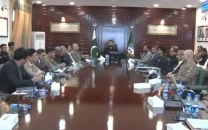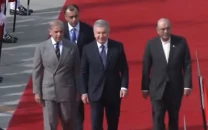IMF: A soft loan with hard conditions
Instead of approaching IMF, govt should issue bonds to raise funds.

So far 11 programmes have been signed successfully but implemented unsuccessfully. ILLUSTRATION: JAMAL KHURSHID
Being a member state, Pakistan joined the IMF in 1988 and so far 11 programmes have been signed successfully but implemented unsuccessfully.
It is also an unfortunate aspect of the Pakistan-IMF relationship that nine programmes went in the accounts of democratic governments whereas two were negotiated by military regimes.
The economic managers, who have played a major role in pushing the economy into an unending debt trap, still remain the same from 1988 to present day. It is also a fact that most of the loan deals with the IMF were signed in the 90s when political instability was at the peak and caretaker governments were in place, who initiated the dialogue with the lender and the elected governments endorsed them later.
Most of the loan deals were standby arrangements through which the IMF met emergency foreign exchange needs of member states. All standby arrangements, except for one, did not reach the conclusion because of lack of implementation of tough conditions.
All expectations and tall claims about breaking down the Kashkol (begging bowl) proved unfounded when the PML-N government held negotiations for another loan amounting to $5.3 billion in an attempt to repay the previous loan. The question remains how the government will justify that in order to get rid of a previous loan it is taking another loan at more tough conditions than the previous one.
It looks like that this tunnel of debt trap does not have any exit. In this regard, the argument that there is no option other than the IMF is entirely unacceptable in the sense that there are a number of countries including IMF member states, which are facing the same instability in foreign exchange accounts but are reluctant to knock the doors of the lender with tough conditions.
India, for instance, whenever gets stuck in such a situation prefers to borrow from non-resident Indians even at higher interest rates. Pakistan can also utilise this option and borrow from overseas Pakistanis by issuing securities like bonds but it seems that the government wants to become a regular client of the IMF, which is only concerned with recovery of the lent amount and nothing else.
The writer hosts business talk shows on FM 101 and Radio Pakistan and is pursuing an M Phil in Economics
Published in The Express Tribune, July 15th, 2013.
Like Business on Facebook, follow @TribuneBiz on Twitter to stay informed and join in the conversation.



















COMMENTS
Comments are moderated and generally will be posted if they are on-topic and not abusive.
For more information, please see our Comments FAQ